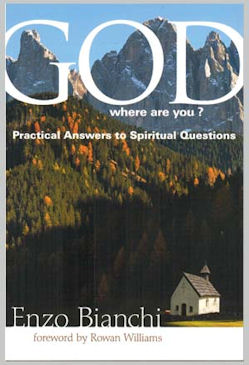
|
Posted November 17, 2014
Book: God Where Are You? Practical Answers to Spiritual Questions Author: Enzo Bianchi Paraclete Press. Brewster. MA. 2014. Pp. 156 An Excerpt from the Jacket:
"God, where are you? Has been the cry of humankind since time began. Repeating that question, while simultaneously searching for its answer, 21st-century monastic Enzo Bianchi looks for God's traces in a variety of places. He finds them, for example, in the searching of significant figures from the Hebrew Scriptures --- in Abraham's questioning of certainties, Jocob's suffering and torment, and in the altering, discouragement, and daunting responsibilities of Moses. This search for God involves exploring what is profoundly human. Ultimately, however, Bianchi finds the greatest manifestation of humanity in the figure of Christ. We cannot think of God today without turning our minds to Jesus, he explains. Then, when we truly begin to search for an answer to this perennial spiritual question, we realize that God is already looking for us. An Excerpt from the Book: It is just after his father's death in the land of Haran that God calls Abraham. Thus the first encounter between Abraham and the living God takes place, not in the form of a vision but in that of a word. It is a sudden, unexpected encounter, and the reader of Genesis recognizes in chapter 12 a true new beginning: the start of the history of salvation. "The Lord said to Abram, 'Go from your country and your kindred and your father's house to the land that I will show you'". One word from God resounds in Abram's heart. It is short, simple, and disconcertingly sober, and at the same time it is new; it has never been heard before. It is a word that surprises Abram and shows that it was not he who had chosen to encounter God but God in his freedom and love who had wanted to encounter him. It is a word addressed directly to Abram, saying "you" as when two human beings meet, yet it is God's word to man, God's first word to man in history, according to Scripture. This word begins with an invitation: Lekh lekba, an expression that literally means "go toward yourself." It is an invitation to leave on a journey that is also interior, comparable in some way to the famous gnothi sauton, "know yourself," of traditional Greek wisdom. Abram continues his father Terah's migration but he is called to enter more deeply into the strange environment in which he finds himself, to travel further and in a sense toward a new destination. In obeying the command to "Go!", he has first of all to make a break with three things: With the land from which he has come; With his idolatrous religious environment; With his father's house, that is, with his kinship ties. The Lord's call is gratuitous, sovereign, and free; it is motivated by love for humanity but it also represents a challenge because it asks for separations that are ever more deep and demanding. God asks us to "leave for," to "go from . . . in order to move towards." It is necessary to take leave of what is known and gives security, and go toward something new that involves risk: for a new life, a true life of communion, it is absolutely essential to free oneself from old ties, because "without a clean break, a good communion is not possible." Yet how hard it is to understand this fact and what a temptation it is to go straight ahead, dragging the heavy burden of lies behind, the past. Here we can ask ourselves why exactly God chose Abram. The biblical texts give us no answer: it is not said that Abram was better than other men or that he was righteous and pleasing to God, as it was said of Noah. No, the call of God is due to nothing but his ecstatic love, which needs go out of itself into someone else, a "beloved." This call is not a response to the merits or virtues of the one called, nor is it a matter of destiny or predestination: no, the reason belongs to the mystery of God! However, the most vital thing for us is that, in that personal call to Abram, that call cannot be a privilege or a reward but only an assumption of responsibility in favor of all. Always the call of God first distinguishes, elects, and separates from others, then shows itself as a call in favor of others. Election and universality are not contradictory but closely related: universality prevents election from becoming a privilege and conversely, election prevents universality from disappearing into an anonymity that recognizes no personal responsibility. So, for Abram, his vocation means first of all believing in the word of God addressed to him, obeying that word truly, concretely, and promptly, and then growing in hope on behalf of others. After the command "Go" comes the destination: "to the land that I will show you." God does not specify where and does not give a name to the promised land but asks Abram to have faith, to believe in the words, "I will show you." First faith, then the indication of the goal: man must arise and walk in complete obedience, then, he is already on the way, God will make clear the goal. Table of Contents: 1. The faith of Abraham 2. Abraham and the binding of Isaac 3. Jacob the deceiver, the victor vanquished 4. Moses and the name of God 5. Elijah and the still small voice 6. The vocation of Isaiah 7. Where is God? Notes |
|
